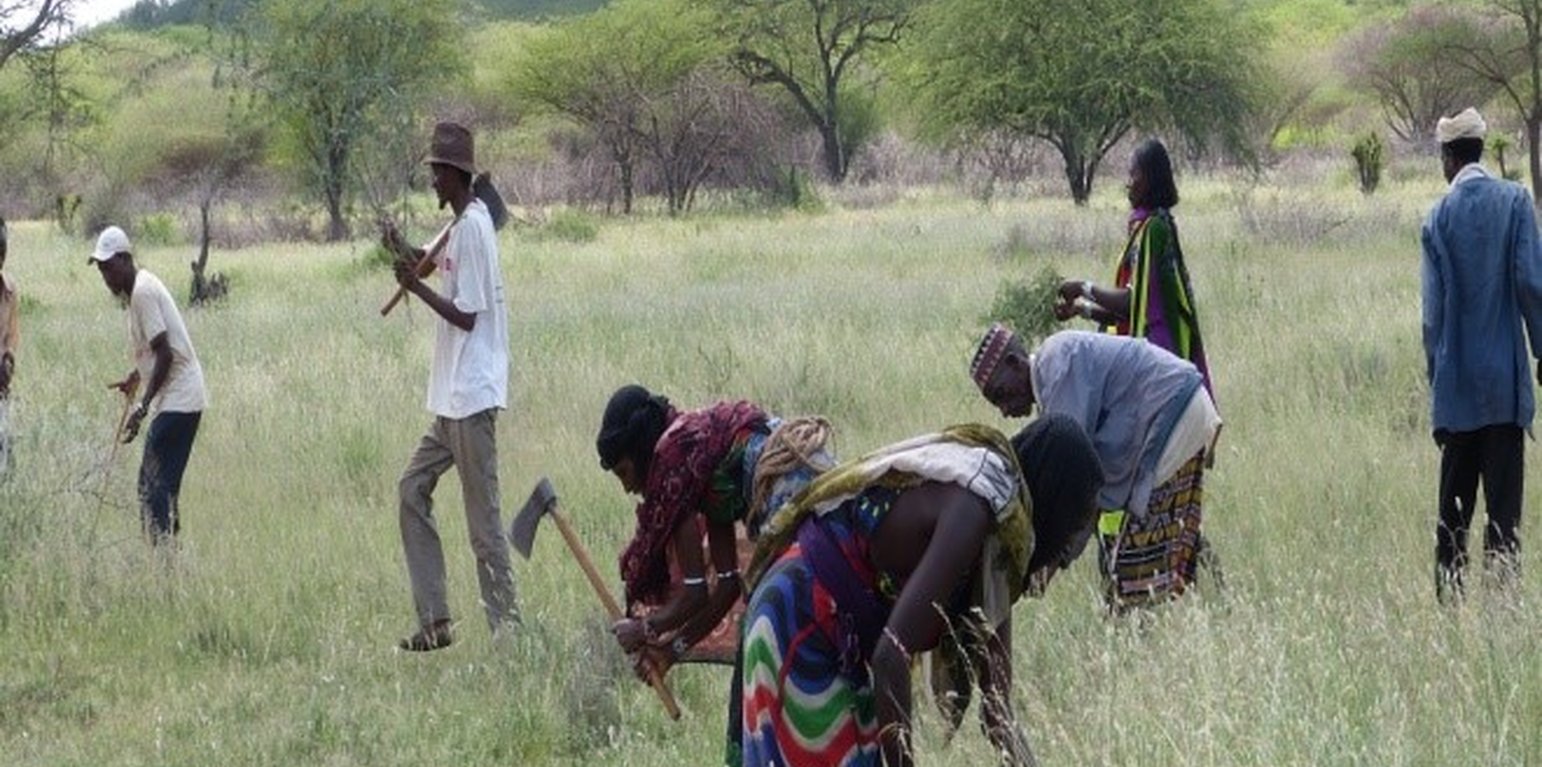Pastoralist field schools
(Этиоп)
Тодорхойлолт
Pastoralist field schools improve livelihoods and resilience of pastoral communities through a process of hands-on experimental and participatory learning. They are "schools without walls" that introduce good agricultural and marketing practices while building on local knowledge. The PFS approach builds heavily on the basic principles of discovery based learning to address a wide range of issues affecting pastoral livelihoods.
The Pastoral Field School (PFS) approach was the key development tool used in the FAO project entitled “Improved food security, livelihoods and resilience of vulnerable pastoral communities in the Greater Horn of Africa through the pastoralist field school approach”. The project was implemented between June 2011 and July 2015 and targeted agropastoralists in the West Pokot and Turkana areas of Kenya, the Karamoja area of Uganda and Borena and Guji Zones of Ethiopia. Indirect beneficiaries included Non-governmental organizations (NGO) and development actors involved in PFS actions across the region, largely through capacity building. The project was implemented through FAO regional and country offices in close collaboration with selected implementation partners in the countries, including communities, both local and international NGOs and governments.
The PFS approach is an adaptation of the Farmer Field School (FFS) approach. The FFS approach emerged in South East Asia in 1989 as a way to better engage farmers in a field-based enquiry for participatory identification and adoption/adaptation of solutions to local problems. The approach builds on the principles of adult and non-formal education, and experimental and emancipatory learning with a focus on learning processes and building analytical capacity as opposed to traditional extension approaches that focus on top-down dissemination of information to farmers. The PFS approach was first tested in 2006 in Kenya by FAO, Vétérinaires Sans Frontières Belgium and the International Livestock Research Institute (ILRI).
A PFS can be described as "school without walls" that introduces new pastoral techniques and practices (including SLM technologies) while building on indigenous knowledge, with community empowerment as a result. Through experiential and participatory learning techniques applied in a group setting (25-30 members), with regular meetings over a season/production cycle, , (agro-)pastoralists learn how to analyse their situation and make informed decisions about their livelihood practices and resource use strategies. When empowered to make informed decisions and adapt to changes in the environment, community members are better able to support disaster risk reduction and mitigation of climate change impacts. A facilitator (trained by an experienced field schoolmaster trainer and with a good understanding of pastoral issues) guides the learning process and ensures that the group activities are interlinked with a community managed disaster risk reduction plan. The technical topics covered can include animal production and health, pasture and range management, dryland farming, livestock fodder production, community-managed disaster risk reduction and alternative incomes. The informal nature of the approach further provides an excellent entry point to address social issues of gender inequities including gender-based violence, HIV, public health, population growth as well as conflict.
Mobility is an important factor to be considered in PFS as it bears on aspects such as the frequency and location of meetings. In some cases, PFS activities have to be interrupted during pastoral movements while in others the facilitator has to follow the field school group during migration. Agro-pastoralists may not always be available to participate in PFS activities as they may spend many hours or days with their livestock in search of water or fodder. Generally, PFS has a longer cycle than groups focusing on small-scale farming, and flexibility is needed when unforeseen events disrupt learning activities. Pastoralists and agro-pastoralists often live in conditions of high environmental uncertainty.
Байршил
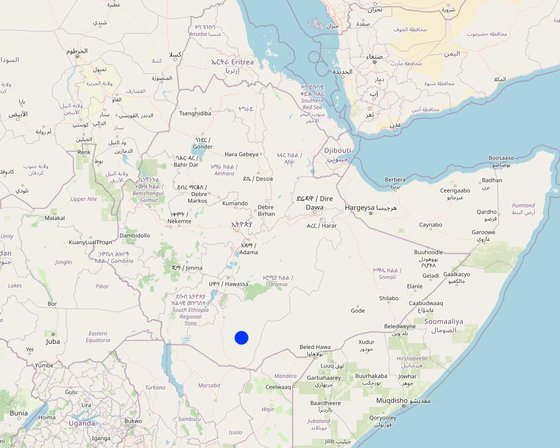
Байршил: Borena zone, Oromia region, Этиоп
Сонгосон байршлуудын газарзүйн холболт
Эхлэх огноо: 2011
Төгсөх жил: тодорхойгүй
Арга барилын төрөл
-
уламжлалт / уугуул
-
Сүүлийн үеийн орон нутгийн санаачлага / шинэчлэл
-
төсөл / хөтөлбөр дээр үндэслэсэн
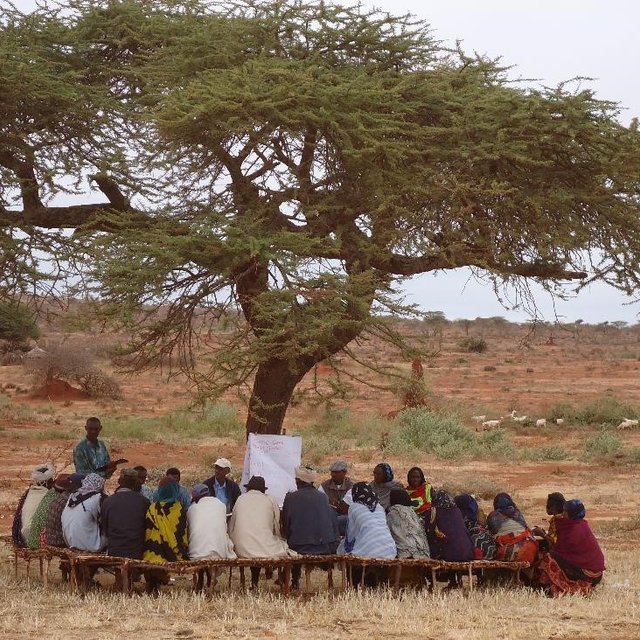
Pastoralist field school meeting (FAO)
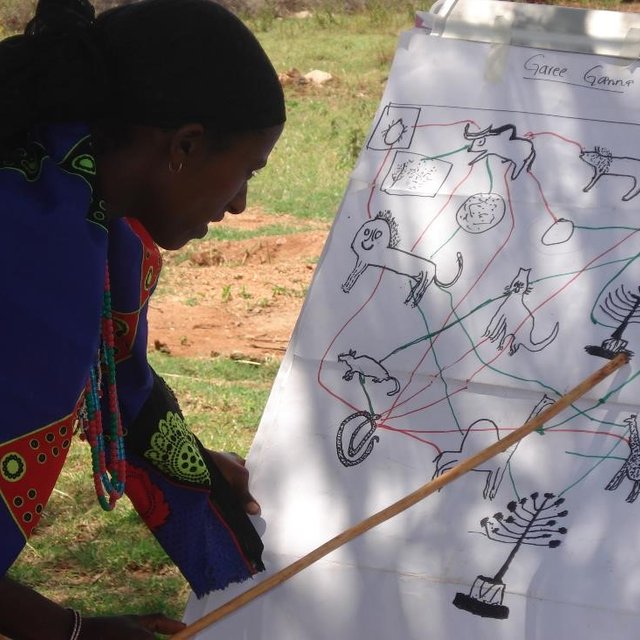
PFS member presenting the results of the agro-ecosystem analysis (AESA) during a PFS session (FAO)
Арга барилын зорилго ба эерэг нөлөө
Арга барилын үндсэн зорилго, зорилт
To strengthen the capacity of pastoral communities and support improved natural resources management and disaster risk management to reduce food insecurity vulnerability.
Тухайн Арга барилын хүрээнд нэвтрүүлсэн Технологийг хэрэгжүүлэхэд дэмжлэг болох нөхцлүүд
-
Нийгэм / соёл / шашны хэм хэмжээ, үнэт зүйлс: - Pastoralists were able, committed and willing to work in teams and to invest their time in PFS learning activities.
- The community had a positive attitude to change and the local culture allowed for innovations.
-
Санхүүгийн нөөц, үйлчилгээний хүртээмж / боломж: - PFS activities, learning and group action facilitated leveraging of financial resources and services. All PFS groups developed savings and credit schemes.
-
Бүтэц зохион байгуулалт: - Efforts towards institutionalization enhanced PFS sustainability, improved quality, and strengthened impact and continuity.
-
ГТМ-ийн талаарх мэдлэг, техникийн дэмжлэг авах боломж: - PFS facilitators received technical support from subject matter specialists (e.g. animal scientists, veterinarians, agronomists). The specialists were invited to the PFS by the facilitators whenever technical inputs and assistance in designing appropriate experiments were needed.
- SLM technologies/ PFS practices were built on indigenous knowledge and local practices.
-
Зах зээл (материал худалдан авах, бүтээгдэхүүн борлуулах), үнэ: - Promoting the use of locally available resources (e.g. agricultural and livestock inputs) was crucial to ensure PFS sustainability and the continuity of PFS activities.
Тухайн Арга барилын хүрээнд нэвтрүүлсэн Технологийг хэрэгжүүлэхэд хүндрэл учруулах нөхцлүүд
-
Талуудыг хамтын ажиллагаа/зохицуулалт: - Networking among implementing actors and key stakeholders could have been stronger.
-
Бодлогууд: - The PFS approach wasn't part of Government structures and procedures, so no enabling policies were in place
Талуудын оролцоо ба үүрэг
Арга барилд оролцогч талууд болон тэдгээрийн үүрэг
| Ямар оролцогч талууд / хэрэгжүүлэгч байгууллагууд арга барилд оролцож байсан бэ? |
Оролцогч талуудыг тодорхойлно уу |
Оролцогч талуудын үүргийг тайлбарлана уу |
| Орон нутгийн газар ашиглагч / орон нутгийн иргэд |
Pastoralists- PFS members and their communties. |
Field school activities were carried out by the pastoralists themselves, ensuring a strong level of involvement of the beneficiaries throughout all stages of implementation. |
| ТББ |
Gayo Pastoral Development Initiative. |
Implement Pastoralist Field School in the Borena zone. |
| Орон нутгийн захиргаа |
- Miyo Pastoral Development Association (Government Institution).
- Moyalle Pastoral Development Association (Government Institution). |
Implement Pastoralist Field School in the Borena zone. |
| Олон улсын байгууллага |
Food and Agriculture Organization of the United Nations (FAO). |
FAO was responsible for overseeing the overall implementation of the intervention, providing mentoring and technical support, create platform for harmonizing the field school approach and allocate required resources for implementation, provide guidance on linkages with related regional pastoral initiatives. The overall day-to-day management of the project was led by FAO's Resilience Team for Eastern Africa (RTEA), drawing on the technical expertise and experience of its headquarters in Nairobi, Kenya and its Subregional Office for Eastern Africa in Addis Ababa. Activities in Ethiopia were supported by the FAO Country Office. FAO field offices implemented the project in the targeted field locations, in collaboration with Non-Governmental Organizations (NGOs) and Government partners. |
Тэргүүлэх байгууллага
Food and Agriculture Organization of the United Nations (FAO)
Арга барилын янз бүрийн үе шатанд орон нутгийн газар ашиглагчид / бүлгүүдийг татан оролцуулах
үгүй
идэвхигүй
Гадаад дэмжлэг
интерактив
өөрийн хүчийг нэгтгэсэн
санаачлага/идэвхжүүлэлт
The PFS approach was presented to pastoral communities and their leaders as well as to local stakeholders (e.g. local government, development partners) to seek buy-in and collaboration.
Төлөвлөгөө
Needs, priorities and opportunities for improvement were identified through a consultative process with the community before and throughout PFS implementation. The PFS members, not the facilitator, decided what was relevant to them and what they wanted the PFS to address.
Хэрэгжилт
As per PFS principles, the pastoral community was involved in all activities during project implementation and had a decision-making role. The dissemination of PFS practices/SLM technologies was encouraged among members and pastoral communities. Exchange visits (educational tours to other PFS), field days (getting non-PFS members involved in PFS activities), and share fairs were organized to promote trade and exchange of ideas.
Мониторинг/ үнэлгээ
The expansion of monitoring and evaluation tools and processes was part of the regular PFS implementation, with exercises and tools embedded in the PFS sessions to assess progress and allow members to take corrective action based on the results.
Impact assessment
A major achievement of the intervention was the participatory impact assessment. The assessment was conducted using a mix of methods, including focus group discussions with PFS members, case stories, semi-structured interviews and scoring of perceived change before and after PFS membership.
Арга барил хэрэгжүүлэх бүдүүвч
Phases and steps of Pastoral Field Schools.
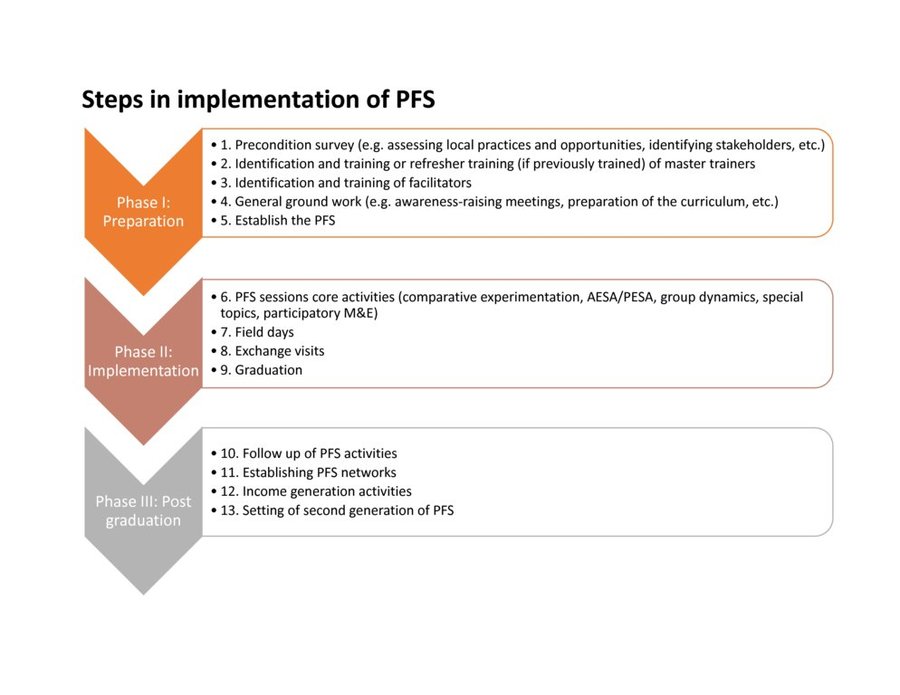
Зохиогч: FAO
ГТМ-ийн технологи сонгох шийдвэр гаргах явц
Шийдвэр гаргасан этгээд
-
Газар ашиглагч дангаараа (өөрийн санаачлага)
-
ГТМ-ийн мэргэжилтнүүдийн дэмжлэгтэйгээр, голчлон газар ашиглагчид
-
оролцооны зарчмын хэсэг болох бүх холбогдох талууд
-
голдуу ГТМ-ийн мэргэжилтнүүд, газар ашиглагчидтай зөвлөлдсөний үндсэн дээр
-
ГТМ-ийн мэргэжилтэн дангаараа
-
улс төрчид / удирдагчид
Шийдвэр гаргах үндэслэл нь
-
ГТМ-ийн мэдлэгийг баримтжуулалтын үнэлгээ (нотолгоонд суурилсан шийдвэр гаргах)
-
Судалгааны үр дүн, ололтууд
-
Хувь хүний туршлага ба санал бодол (баримтжуулаагүй)
-
hands-on testing and adaptation for local use
Техникийн туслалцаа, чадавхи бий болгох болон мэдлэгийн менежмент
Дараах үйл ажиллагаа эсвэл үйлчилгээ нь арга барилын нэг хэсэг болсон
-
Чадавхи бэхжүүлэх/сургалт
-
Зөвлөх үйлчилгээ
-
Институцийг бэхжүүлэх (байгууллагын хөгжил)
-
Мониторинг ба үнэлгээ
-
Судалгаа
Чадавхи бэхжүүлэх / сургалт
Дараах сонирхогч талуудад сургалт хийсэн
-
Газар ашиглагчид
-
хээрийн ажилтан / зөвлөх
Сургалтын хэлбэр
-
Ажил дээр
-
фермерээс -фермер
-
үзүүлэнгийн талбай
-
Олон нийтийн уулзалт
-
курс дамжаа
Хамарсан сэдэв
The curriculum of PFS groups generally focused on: methodology and implementation, participatory learning and facilitation, group management and technical topics.
Some of the technical topics covered by the facilitator include gender, NRM, nutrition, forage production and health, conflict management, business skills development, village community banks (VICOBA), rangeland management, soil and water conservation and community-managed disaster risk reduction (CMDRR), and water scheme management.
Зөвлөх үйлчилгээ
Зөвлөх үйлчилгээ үзүүлсэн
-
Газар ашиглагчийн талбай дээр
-
Тогтмол төвд
PFS are ‘schools without walls’ where capacity is developed from existing local knowledge. They are learning by doing and problem based, on the fields/rangelands of the community. PFS usually comprises a group of 25-30 pastoralists who meet regularly in a local field setting, under the guidance of a trained facilitator. They make observations on livestock production and rangeland ecosystem, focus on a topic of study, and compare the effects of alternative practices. As a result of the observations and analyses done directly on-site, participants make decisions on how to improve their practices. All PFS follow this systematic action learning process where the key steps are observation, reflection, group discussion, analysis, decision making and action planning.
Институцийг бэхжүүлэх
Институци бэхжисэн / бий болсон
-
Үгүй
-
Тийм, бага
-
Тийм, дунд зэрэг
-
Тийм, маш их
дараах түвшинд
-
Орон нутгийн
-
Бүс нутгийн
-
Үндэсний
Байгууллага, үүрэг, хариуцлага, гишүүд зэргийг тодорхойлно уу.
The two government institutions (Miyo Pastoral Development Association and Moyalle Pastoral Development Association). and the NGO (Gayo Pastoral Development Initiative) that implemented the approach in the target area has been strengthened through capacity building on PFS.
Дэмжлэгийн төрөл
-
Санхүүгийн
-
чадавхи бэхжүүлэх / сургалт
-
Тоног төхөөрөмж
Дэлгэрэнгүй мэдээлэл
Мониторинг ба үнэлгээ
Monitoring was conducted by the Swiss Agency for Development and Cooperation (SDC) office in Addis Ababa as well as through field missions and regular dialogue with the FAO Country Office in Ethiopia.
As per PFS priniciples, participatory M&E was also conducted during every PFS meeting. Both the PFS members and facilitator continuously assessed whether they were bringing any behavioural changes and actually achieving the learning objectives. Participatory M&E helped PFS practitioners actively observe and analyse situations and performances and understand what they were observing.
Судалгаа
Судалгаа нь дараах сэдвийг хамарсан
-
Социологи
-
Эдийн засаг/ зах зээл
-
Экологи
-
Технологи
When needed, researchers and subject matter experts were invited to provide technical support to PFS groups. PFS developed/strengthened linkages between pastoral communities and researchers.
Санхүүжилт болон хөндлөнгийн материаллаг дэмжлэг
ГТМ-ийн бүрэлдэхүүн хэсгийн жилийн төсөв ам.доллараар
-
< 2,000
-
2,000-10,000
-
10,000-100,000
-
100,000-1,000,000
-
> 1,000,000
Precise annual budget: тодорхойгүй
The budget range above refers to the costs incurred for implementing a single PFS within the project.
The Government of the Swiss Confederation, through the Swiss Agency for Development and Cooperation, contributed USD 2 154 100 for this FAO for this FAO project in Ethiopia, Kenya and Uganda.
Газар ашиглагч нарт дараах урамшуулал, үйлчилгээг үзүүлсэн
-
Газар ашиглагчдад санхүүгийн / материаллаг дэмжлэг үзүүлсэн
-
Тодорхой хөрөнгө оруулалтанд нөхөн олговор олгох
-
Кредит
-
Бусад урамшуулал, хэрэгсэл
Газар ашиглагчдад санхүүгийн болон материаллаг дэмжлэг үзүүлэх
Each PFS group received direct grants of USD 940 for their learning activities and to purchase inputs for PFS experimentation.
Нөлөөллийн дүн шинжилгээ ба дүгнэлт
Арга барилын үр нөлөө
Үгүй
Тийм, бага зэрэг
Тийм, зарим
Тийм, их
Арга барил нь орон нутгийн газар ашиглагчдыг чадваржуулах, оролцогч талуудын оролцоог сайжруулсан уу?
PFS enabled and empowered pastoralists, their families and pastoral communities to understand and respond to local challenges. PFS members improved their understanding of the environment, obtained knowledge and learned additional skills which lead to improved capacity to manage available resources. PFS groups showed a greater level of cooperation and mutual help compared to the situation prior to the PFS project. PFS groups demonstrated enhanced capacity to seek self-generated solutions to problems identified by the group, generally developed through the experimentation and field analysis component of PFS, which in turn positively impacted on adoption rates of new practices and technologies.
Арга барил нь нотолгоонд суурилсан шийдвэр гаргах боломж олгосон уу?
PFS helped pastoralists to develop the skills required for informed decision-making in their environment.
Арга барил нь ГТМ-ийн технологийг хэрэгжүүлж, хадгалахад газар ашиглагчдад тусласан уу?
As PFS members carried out PFS practices themselves and saw the direct results of the processes, they took ownership of the innovations and decisions on their livelihood activities. This was further enhanced by reduced production costs and the proceeds which the groups received from PFS practices that encouraged the members to continue with the efforts since they paid off.
Арга барил нь ГТМ-ийн зардал хэмнэсэн хэрэгжилт, зохицуулалтыг сайжруулсан уу?
Policy dialogue for institutionalizing PFS as an extension approach were successfully conducted with the federal Ministry of Agriculture and regional agriculture bureau and donors . The initial policy processes were funded by the European Union (EU) and the Swiss Agency for Development and Cooperation (SDC). They involved field implementation of field schools with policy deliberations at the local Government levels and cascading slowly to the National level. Later, an FAO project funded by SDC continued with the institutionalization process at the National level, Universities and research institutions.
Policy makers are now willing to use the approach in the (agro)-pastoral areas of Ethiopia.
Арга барил нь ГТМ-ийн хэрэгжилтийн санхүүгийн эх үүсвэрийн хүртээмжийг сайжруулах / эргэлтэнд оруулахад чиглэсэн үү?
PFS increased the abilty of pastoralists to leverage appropriate financial services through group action and improved skills and knowledge.
The savings and credit schemes built into PFS interventions and resulting income generating activities contributed to an increase in financial capital. In general the money contributed benefited both men and women equally. However, in many cases women were the more frequent beneficiaries since they frequently borrowed to engage in petty businesses.
Арга барил нь ГТМ хэрэгжүүлэхэд газар ашиглагчдын мэдлэг, чадварыг сайжруулахад хүргэсэн үү?
PFS activities increased the awareness of communities on the sustainable management of natural resources and its relation to group productive and income generating activities. The PFS approach, in contrast to most conventional extension approaches, strengthens the capacity of local communities to analyse their livelihood systems, identify their main constraints and test possible solutions. By merging their own traditional knowledge with external information, stakeholders can eventually identify and adopt the most suitable practices and technologies to their livelihood system and needs to become more productive, profitable and responsive to changing conditions
Энэ арга барил бусад сонирхогч талуудын мэдлэг, чадавхийг сайжруулсан уу?
The PFS approach improved knowledge and capacities of stakeholders at different levels starting from Federal to communities level.
Арга барил нь оролцогч талуудын хооронд институци, хамтын ажиллагааг бий болгож, бэхжүүлсэн үү?
The approach strengthens individuals’ knowledge and practices whilst reinforcing collaborative learning and bonding. By learning together over an extended period of time, collaboration between stakeholders/beneficiaries is strengthened.
Энэ арга барил зөрчилдөөнийг багасгасан уу?
Part of this approach includes incorporating conflict management more strongly. Through the PFS approach, stakeholders developed a greater understanding of how to plan for and mitigate disaster, and recognized how social factors such as conflict and gender inequality can exacerbate the effects of disasters.
Арга барил нь эмзэг бүлгийнхнийг нийгэм, эдийн засгийн хувьд чадавхижуулсан уу?
Many groups had set rules for dealing with individual financial requirements, as well as individual emergencies, requiring group cohesion and solidarity support mechanisms, thus enhancing the community internal safety net for vulnerable members.
Арга барил нь жендэрийн тэгш байдлыг сайжруулж, эмэгтэйчүүд, охидыг чадавхжуулсан уу?
Women benefited from the initiative through empowerment and income generation through livelihood diversification. Women’s empowerment – i.e. enabling their inherent potential – was considered as one of the most prominent impacts of the intervention.
Changes in gender relations as a result of the PFS approach was prominent. Women appreciated the fact that the PFS groups offered the opportunity for them to discuss issues and challenges with men in an organised and moderated manner. In general, and given the prevailing cultural norms, women had the opportunity to make their voices and arguments heard in all PFS groups.
Арга барил нь газар ашиглагч залуучууд / дараагийн үеийн хүмүүсийг ГТМ-д оролцохыг хөхүүлэн дэмжсэн үү?
Elema Kensa, a young PFS lady member said, “Women benefit from the enclosure in many ways. Before, women used to go very far in order bring food to our livestock. But, thanks to the PFS and our enclosure now we can harvest the grass nearby and give it to our livestock. Having this grass nearby reduces the burden of the women and this is a result of the education we got from PFS.”
Арга барил нь ГТМ-ийн технологийг хэрэгжүүлэхэд саад учруулсан газрын эзэмшил / ашиглах эрхийг сайжруулахад чиглэсэн үү?
The community initiative led by the PFS group has taken to practicing the approach for their own livestock needs. The protected community grazing lands were fenced off, and livestock grazing was restricted and managed.
Арга барил нь чанаржуулсан шим тэжээл/ хүнсний аюулгүй байдалд хүргэсэн үү?
Supported by PFS training and financed through the group saving schemes, most PFS groups initiated alternative income sources, resulting in diversified livelihood options and thereby increased food security and nutrition.
The domestic food situation improved since the start of PFS activities in the target area as a result of increased agricultural production and increased purchasing power to buy additional food from alternative income sources.
Арга барил нь зах зээлийн хүртээмжийг сайжруулсан уу?
PFS activities increased access to input (e.g. agricultural equipment) and output markets and helped pastoralists to leverage appropriate markets and market information.
Арга барил нь ус, ариун цэврийн байгууламжийн хүртээмжийг сайжруулахад хүргэсэн үү?
Water for human and livestock use was improved through the improved water management practices applied by the group.
Арга барил нь эрчим хүчний эх үүсвэр/ илүү тогтвортой ашиглалтад хүргэх үү?
By closing off grazing areas, shrubs and trees were also protected. These species can be a source of fuelwood, but are often degraded.
Арга барил нь хөдөлмөр эрхлэлт, орлогын боломжид хүргэсэн үү?
The PFS members developed different alternative income generating activities which range from petty business especially for women, beekeeping, purchasing animal for fattening and re-sale, and purchasing and sale of animals without fattening.
Газар ашиглагчид ГТМ хэрэгжүүлэх болсон үндсэн шалтгаан
-
үйлдвэрлэл нэмэгдсэн
-
Ашиг нэмэгдсэн (боломж), зардал-үр ашгийн харьцаа сайжирсан
-
Газрын доройтол буурсан
-
Гамшигийн эрсдэл буурсан
-
Ажлын ачаалал бууруулсан
-
төлбөр / татаас
-
дүрэм журам (торгууль) / сахиулах
-
нэр хүнд, нийгмийн дарамт / нийгмийн холбоо
-
Сүлжээ/ бүлэг төсөл/ хөдөлгөөнд гишүүнээр элсүүлэх
-
Байгаль орчны ухамсар
-
зан заншил, ёс суртахуун
-
ГТМ-ийн мэдлэг, туршлага дээшилсэн
-
гоо зүйн сайжруулалт
-
зөрчилдөөнийг бууруулах
Арга барилын хүрээнд хэрэгжүүлсэн үйл ажиллагааны тогтвортой байдал
Газар ашиглагчид арга барилаар дамжуулан хэрэгжүүлсэн арга хэмжээг тогтвортой үргэлжлүүлж чадах уу (гадны дэмжлэггүйгээр)?
The PFS promoted practices that build on local knowledge and practice and that require locally available production inputs.
Дүгнэлт, сургамж
Давуу тал: газар ашиглагчийн бодлоор
-
This activity has improved the status of women through enabling them and offering them a greater spectrum of livelihood options.
-
PFS activities increased the awareness on sustainable management of the natural resources. This is an achievement as the PFS communities increase their income diversity and income generating capacity facilitated through natural resources.
-
The groups decided by discussion on emerging issues to be dealt with. This built considerable coherence within the group and ensured that those topics that were important were selected.
Давуу тал: эмхэтгэгч эсвэл бусад мэдээлэл өгсөн хүмүүсийн бодлоор
-
The PFS approach in general contributed to generating increased, appropriate and self-defined livelihood options. Members have therefore the opportunity to improve their livelihood portfolio by spreading their activity base and thus prepare better for emerging challenges of greater variability than the community is used to.
-
The opportunity for members, especially women to meet, discuss at equal level with men and focus on problem solving. This is very much appreciated in a community setting where tribal institutions are respected. PFS groups show a greater level of cooperation and mutual help as compared to the situation prior the PFS intervention.
-
The approach does not rely on highly trained external advisors but on pastoralists' own discovery and reflection. It can function well even with facilitators of relatively low technical skills. This allows for scaling up of interventions more easily, since solutions are obtained jointly through an experimentation process.
Сул тал/ дутагдал / эрсдэл: газар ашиглагчийн бодлоордаван туулах боломжууд
-
Attending PFS sessions requires time and effort, something participants not always have.
This is mostly a problem at the beginning. As soon as it becomes clear to participants what the added value of the approach is then they are perfectly fine with putting in the required effort and time. It is therefore important to make clear right from the beginning what the (expected) benefits to participants are.
-
Quality of implementation of PFS largely depends on the organizational, communication and methodological skills of facilitators as well as on their regular availability throughout the FFS cycle. In some instances, poor quality of facilitators has led to inadequate experimentation and ecosystem analysis.
Continuous support is required to improve the facilitation skills of facilitators.
-
Aligning PFS approach into the government extension system requires commitment of policy makers.
National platforms, policy makers visit of PFS activities and use of public media are some the mechanisms for creating awareness for institutionalizing PFS into the government extension sytem.
Сул тал/ дутагдал / эрсдэл: эмхэтгэгч эсвэл бусад мэдээлэл өгсөн хүмүүсийн бодлоордаван туулах боломжууд
-
There is room for improving experimentation and linking it more strongly to an ecosystem analysis.
Better training of facilitators.
-
While taking up the issue of conflict and conflict management, the approach does not always fully cover the complete socioeconomic interconnections that the problem of conflicts in pastoral areas is linked to.
Make sure that a detailed socioeconomic analysis is undertaken before the interventions start. This will help in ensuring better coverage of all the complex relationships and interconnections.
-
Different institutions implement PFS differently.
Harmonization of the field school approach is critical among the field school practioners.
Суурь мэдээлэлүүд
Хянагч
-
Donia Mühlematter
-
Barbara *
-
Rima Mekdaschi Studer
-
Joana Eichenberger
Баримтжуулсан огноо: 05 1-р сар 2018
Сүүлийн шинэчлэл: 21 8-р сар 2024
Мэдээлэл өгсөн хүн
-
Deborah Duveskog (Deborah.Duveskog@fao.org) - ГТМ мэргэжилтэн
-
Solomon Nega (Solomon.Nega@fao.org) - ГТМ мэргэжилтэн
WOCAT мэдээллийн сан дахь бүрэн тодорхойлолт
Баримтжуулалтыг зохион байгуулсан
Байгууллага
- FAO Kenya (FAO Kenya) - Кени
- Food and Agriculture Organization of the United Nations (FAO) - Итали
Төсөл
- Book project: Guidelines to Rangeland Management in Sub-Saharan Africa (Rangeland Management)
- Improved food security, livelihoods and resilience of vulnerable pastoral communities in the Greater Horn of Africa through the pastoralist field school approach
Гол сурвалж баримт сэлт
-
Impact Assessment of Pastoralist Field Schools in Ethiopia, Kenya and Uganda: http://www.fao.org/fileadmin/user_upload/drought/docs/PFS%20IA%20report%20final.pdf
-
Improved food security, livelihoods and resilience of vulnerable pastoral communities in the Greater Horn of Africa through the pastoral field school approach OSRO/RAF/103/SWI - Final report:
Холбогдох мэдээллийн интернет холбоос
